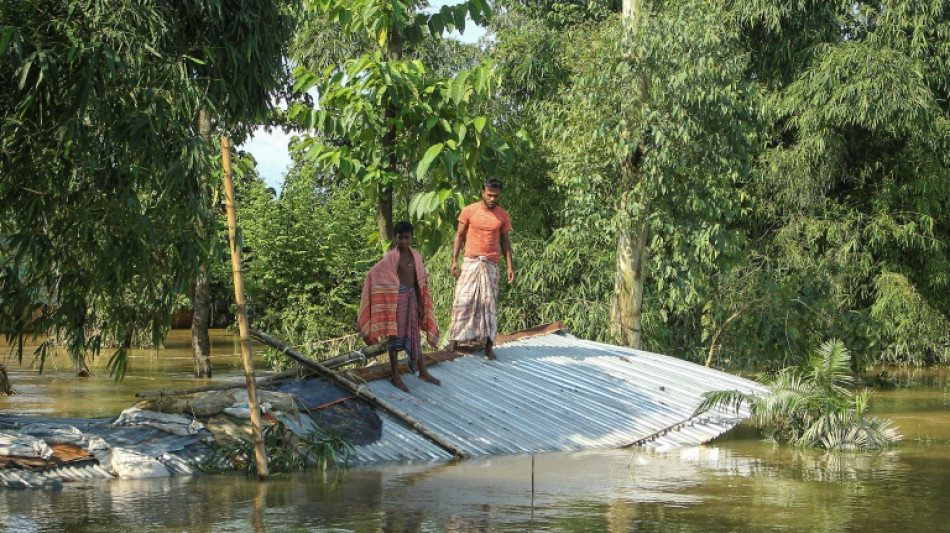
-
 UK economy stagnant in third quarter in fresh setback
UK economy stagnant in third quarter in fresh setback
-
Sweden says China denied request for prosecutors to probe ship linked to cut undersea cables

-
 African players in Europe: Salah leads Golden Boot race after brace
African players in Europe: Salah leads Golden Boot race after brace
-
Global stock markets edge higher as US inflation eases rate fears

-
 German far-right AfD to march in city hit by Christmas market attack
German far-right AfD to march in city hit by Christmas market attack
-
Ireland centre Henshaw signs IRFU contract extension

-
 Bangladesh launches $5bn graft probe into Hasina's family
Bangladesh launches $5bn graft probe into Hasina's family
-
US probes China chip industry on 'anticompetitive' concerns

-
 Biden commutes sentences for 37 of 40 federal death row inmates
Biden commutes sentences for 37 of 40 federal death row inmates
-
Clock ticks down on France government nomination

-
 'Devastated' Australian tennis star Purcell provisionally suspended for doping
'Devastated' Australian tennis star Purcell provisionally suspended for doping
-
Mozambique on edge as judges rule on disputed election

-
 Mobile cinema brings Tunisians big screen experience
Mobile cinema brings Tunisians big screen experience
-
Philippines says to acquire US Typhon missile system

-
 Honda and Nissan to launch merger talks
Honda and Nissan to launch merger talks
-
Police arrest suspect who set woman on fire in New York subway

-
 China vows 'cooperation' over ship linked to severed Baltic Sea cables
China vows 'cooperation' over ship linked to severed Baltic Sea cables
-
Australian tennis star Purcell provisionally suspended for doping

-
 Asian markets track Wall St rally as US inflation eases rate fears
Asian markets track Wall St rally as US inflation eases rate fears
-
Luxury Western goods line Russian stores, three years into sanctions

-
 Wallace and Gromit return with comic warning about AI dystopia
Wallace and Gromit return with comic warning about AI dystopia
-
Philippine military says will acquire US Typhon missile system

-
 Afghan bread, the humble centrepiece of every meal
Afghan bread, the humble centrepiece of every meal
-
Honda and Nissan expected to begin merger talks

-
 'Draconian' Vietnam internet law heightens free speech fears
'Draconian' Vietnam internet law heightens free speech fears
-
Israeli women mobilise against ultra-Orthodox military exemptions

-
 Asian markets track Wall St rally as US inflation eases rate worries
Asian markets track Wall St rally as US inflation eases rate worries
-
Tens of thousands protest in Serbian capital over fatal train station accident

-
 Trump vows to 'stop transgender lunacy' as a top priority
Trump vows to 'stop transgender lunacy' as a top priority
-
Daniels throws five TDs as Commanders down Eagles, Lions and Vikings win

-
 'Who's next?': Misinformation and online threats after US CEO slaying
'Who's next?': Misinformation and online threats after US CEO slaying
-
Only 12 trucks delivered food, water in North Gaza Governorate since October: Oxfam

-
 Strawberry Fields REIT Enters Into Agreement for Six Healthcare Facilities Located in Kansas
Strawberry Fields REIT Enters Into Agreement for Six Healthcare Facilities Located in Kansas
-
NanoViricides is in a Great Position to Fight Potential Bird Flu Pandemic with a Drug that the Mercurial H5N1 Influenza A Virus is Unlikely to Escape

-
 Zomedica Launches Two New Quantitative Assays on the TRUFORMA(R) Platform: Canine NT-proBNP and Progesterone
Zomedica Launches Two New Quantitative Assays on the TRUFORMA(R) Platform: Canine NT-proBNP and Progesterone
-
MainStreetChamber Holdings, Inc. Submits 15(c)211 Application

-
 InterContinental Hotels Group PLC Announces Transaction in Own Shares - December 23
InterContinental Hotels Group PLC Announces Transaction in Own Shares - December 23
-
Melrose Group Publicly Files Complaint to the Ontario Securities Commission

-
 Langers edge Tiger and son Charlie in PNC Championship playoff
Langers edge Tiger and son Charlie in PNC Championship playoff
-
Explosive batsman Jacobs gets New Zealand call-up for Sri Lanka series

-
 Holders PSG edge through on penalties in French Cup
Holders PSG edge through on penalties in French Cup
-
Slovak PM Fico on surprise visit to Kremlin to talk gas deliveries

-
 Daniels throw five TDs as Commanders down Eagles
Daniels throw five TDs as Commanders down Eagles
-
Atalanta fight back to take top spot in Serie A, Roma hit five

-
 Mancini admits regrets over leaving Italy for Saudi Arabia
Mancini admits regrets over leaving Italy for Saudi Arabia
-
Run machine Ayub shines as Pakistan sweep South Africa

-
 Slovak PM Fico on surprise visit to Kremlin
Slovak PM Fico on surprise visit to Kremlin
-
Gaza rescuers say Israeli strikes kill 35

-
 'Incredible' Liverpool must stay focused: Slot
'Incredible' Liverpool must stay focused: Slot
-
Maresca 'absolutely happy' as title-chasing Chelsea drop points in Everton draw


Nearly 1 in 4 globally at risk from severe flooding: study
Almost a quarter of the world's population are exposed to significant flood risks, according to new research published Tuesday, which warned those in poorer countries were more vulnerable.
Inundations from heavy rainfall and storm surges affect millions of people every year and cause billions of dollars of damage to homes, infrastructure and economies.
And the risks are rising as climate change causes more extreme precipitation and sea level rise, as exposed populations swell.
The new study, published in the journal Nature Communications, looked at global data on flood risks from the sea, rivers and rainfall, as well as population distribution and poverty estimates from the World Bank.
It found about 1.81 billion people -- or 23 percent of the people on the planet -- are directly exposed to floods of over 15 centimetres (six inches) in 1-in-100-year flooding.
"This would pose significant risks to lives and livelihoods, especially of vulnerable population groups," the study said.
Overall, nearly 90 percent of those exposed to inundations live in lower or middle income countries, according to the study.
It also concluded the number of people living in poverty and under severe flood risk is "substantially higher than previously thought".
Researchers found some $9.8 trillion of economic activity globally -- around 12 percent of the global gross domestic product in 2020 -- is located in areas exposed to severe flooding.
But they said concentrating simply on a monetary value could cause a bias of attention towards higher income countries and economic hubs.
"By accounting for the poverty levels of exposed populations, we show that low-income countries are disproportionately exposed to flood risks, while being more vulnerable to disastrous long-term impacts," said the study by Jun Rentschler of the World Bank and colleagues.
- Growing risks -
Overall, the study estimated most people exposed to flooding -- 1.24 billion -- are in South and East Asia, with China and India accounting for over a third of the global total.
Some 780 million people living on under $5.50 a day are at risk from once-in-a-hundred-year floods, it found.
The research provides "the first global estimates of the interaction between exposure to flood risk, and poverty", said Thomas McDermott, of the National University of Ireland Galway, in a linked commentary published in Nature Communications.
The authors said previous studies were often limited by geography or the type of flood risk assessed and had underestimated just how many people across the world are exposed.
"Climate change and risky urbanisation patterns are expected to further aggravate these risks in coming years," they added.
According to World Weather Attribution, a network of scientists tracing the impacts of climate change, global warming has made extreme rainfall more common and more intense across most of the world.
This has likely made flooding more severe in these areas, although scientists stress the other human factors also play a part, such as decisions about where homes and infrastructure are built.
This month, record floods in southern China displaced more than half a million people.
In Bangladesh, the Red Cross said Tuesday seven million people are still in "desperate" need of shelter and aid after some of the heaviest rains in a century swelled rivers to record levels and inundated rural villages.
M.A.Colin--AMWN



